

Farah025
Parenting3. The authoritarian parenting style: What does it look like? © 2010-2018 Gwen Dewar, Ph.D., all rights reserved The authoritarian parenting style: Little nurturing, lots of psychological control You might have a good handle on what it means to favor authoritarian government: The blind submission to authority.

The stifling of autonomous, critical thinking. What Is Permissive Parenting? Permissive parenting is a type of parenting style characterized by low demands with high responsiveness.
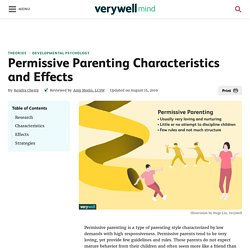
Permissive parents tend to be very loving, yet provide few guidelines and rules. Characteristics and Effects of Uninvolved Parenting. Uninvolved parenting, sometimes referred to as neglectful parenting, is a style characterized by a lack of responsiveness to a child's needs.
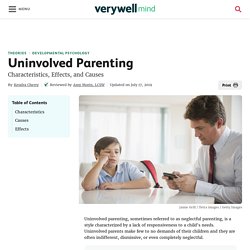
Uninvolved parents make few to no demands of their children and they are often indifferent, dismissive, or even completely neglectful. The Major Parenting Styles During the 1960s, psychologist Diana Baumrind described three different parenting styles based on her research with preschool-age children: authoritarian, authoritative, and permissive parenting. In later years, researchers added a fourth style known as uninvolved parenting. Photo taken in Melbourne by me; An observation of affection between a father towards his son. How To Identify The 4 Parenting Styles and Decide What's Best. Parenting is hard these days.

We have so much access to information and science, but it can be hard to determine where we fit in and if it’s best for our children. This week we’re going to break down the 4 main parenting styles that exist. We’ll identify their characteristics and learn how each can affect your child. For most parents we think there are only 2, maybe 3, parenting styles. Most think that either you punish or you don’t, and then there are those who aren’t even the adult in the relationship, but what’s the fourth option? Parental Psychological Control of Children – Dr. Craig Childress: Attachment Based "Parental Alienation" (AB-PA) In his book, Intrusive Parenting: How Psychological Control Affects Children and Adolescents, published by the American Psychological Association, Brian Barber and his colleague, Elizabeth Harmon, define the psychological control of children by a parent: “Psychological control refers to parental behaviors that are intrusive and manipulative of children’s thoughts, feelings, and attachment to parents.”
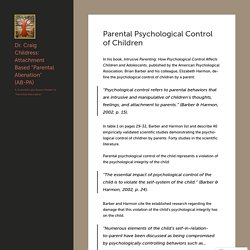
(Barber & Harmon, 2002, p. 15). In table 1 on pages 29-32, Barber and Harmon list and describe 40 empirically validated scientific studies demonstrating the psychological control of children by parents. Forty studies in the scientific literature. Parental psychological control of the child represents a violation of the psychological integrity of the child. “The essential impact of psychological control of the child is to violate the self-system of the child.”
The empirically validated scientific research of Stone, Buehler, and Barber (2002) used two separate samples of families. Barber, B. Articles on Social Development of Children. Attachment Styles. What is Attachment Theory? Why is it important? Attachment is a theory about danger and how we organize in the face of it Crittenden and Clausson 2000 We hear a lot about ‘attachment’ and its important in care proceedings.
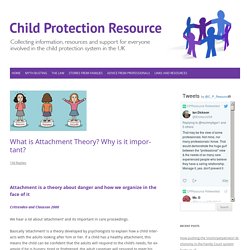
Basically ‘attachment’ is a theory developed by psychologists to explain how a child interacts with the adults looking after him or her. If a child has a healthy attachment, this means the child can be confident that the adults will respond to the child’s needs, for example if he is hungry, tired or frightened, the adult caregiver will respond to meet his needs or reassure and comfort him. This gives the child confidence to explore his environment and develop a good sense of self-esteem. If a child can’t rely on his carers to look after him and respond consistently, this has been noted to have potentially very serious and damaging consequences for the adult that child will become.
The Different types of Attachment Styles. Children who are securely attached generally become visibly upset when their caregivers leave and are happy when their parents return.

When frightened, these children will seek comfort from the parent or caregiver. MOTHER-CHILD ATTACHMENT - Upbility.net. Videos. PODCAST: Parenting With Love & Logic - Jim Fay & Dr Daniel Amen. Video Presentation 4 Different Parenting Styles. The Difference Between Positive/Negative Reinforcement and Positive/Negative Punishment [with Examples] - ParentingForBrain. Reinforcement and punishment are often used as parenting tools to modify children’s behavior.
![The Difference Between Positive/Negative Reinforcement and Positive/Negative Punishment [with Examples] - ParentingForBrain](http://cdn.pearltrees.com/s/pic/th/reinforcement-punishment-183049524)
Let’s review the difference between positive reinforcement and negative reinforcement, and the difference in outcomes between them. The Difference Between Positive And Negative Reinforcement In behavioral psychology, reinforcement is the introduction of a favorable condition that will make the desired behavior more likely to happen, continue or strengthen in the future1.
Because the favorable condition acts as a reward, reinforcement is a reward-based operant conditioning. There are two types of reinforcement: positive reinforcement and negative reinforcement. These two types of reinforcement can be confusing because the technical terms used in psychology is often misrepresented in pop culture. As technical parlance, positive refers to adding a factor while negative refers to removing a factor. But positive and negative do not represent the quality of the factor being added or removed. What's The Difference Between Positive and Negative Punishment? - North Shore Pediatric Therapy. Parenting: Using Rewards and Punishments (Guide) Parenting can be a personal and a touchy subject.
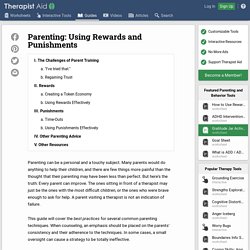
Many parents would do anything to help their children, and there are few things more painful than the thought that their parenting may have been less than perfect. But here's the truth: Every parent can improve. The ones sitting in front of a therapist may just be the ones with the most difficult children, or the ones who were brave enough to ask for help. A parent visiting a therapist is not an indication of failure. This guide will cover the best practices for several common parenting techniques. Most of the advice in this guide—unless noted otherwise—is effective for teenagers as well as younger children. The Challenges of Parent Training "I've tried that. " Before asking for help, most parents have tried it all. As a therapist, it's important to take special care listening to what a parent has tried, what has worked, and what hasn't worked.
Regaining Trust Rewards This guide covers rewards before punishments for a reason. Parenting Styles Quiz. References.